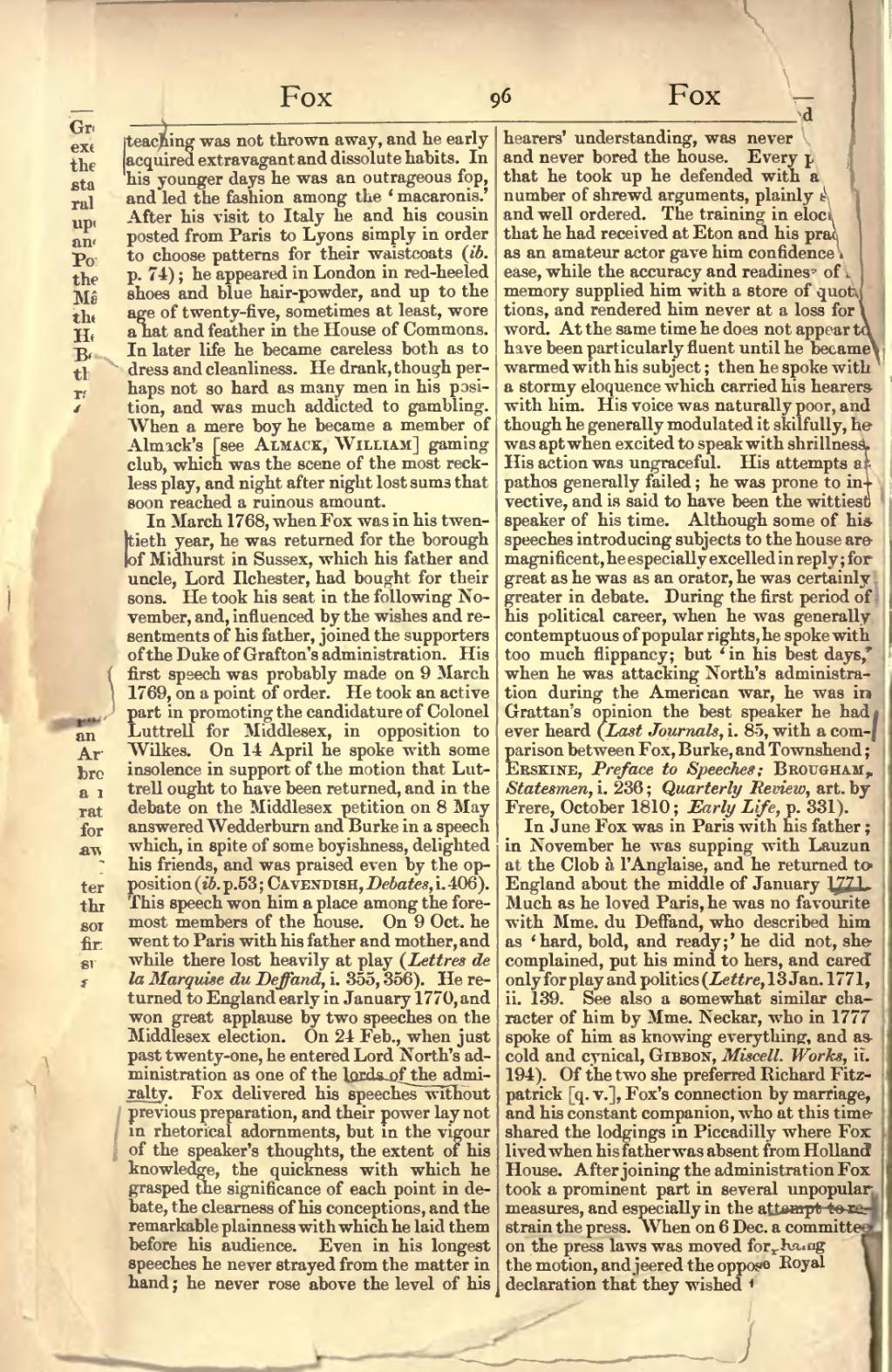teaching was not thrown away, and he early acquired extravagant and dissolute habits. In his younger days he was an outrageous fop, and led the fashion among the ‘macaronis.’ After his visit to Italy he and his cousin posted from Paris to Lyons simply in order to choose patterns for their waistcoats (ib. p. 74); he appeared in London in red-heeled shoes and blue hair-powder, and up to the age of twenty-five, sometimes at least, wore a hat and feather in the House of Commons. In later life he became careless both as to dress and cleanliness. He drank, though perhaps not so hard as many men in his position, and was much addicted to gambling. When a mere boy he became a member of Almack's [see Almack, William] gaming club, which was the scene of the most reckless play, and night after night lost sums that soon reached a ruinous amount.
In March 1768, when Fox was in his twentieth year, he was returned for the borough of Midhurst in Sussex, which his father and uncle, Lord Ilchester, had bought for their sons. He took his seat in the following November, and, influenced by the wishes and resentments of his father, joined the supporters of the Duke of Grafton's administration. His first speech was probably made on 9 March 1769, on a point of order. He took an active part in promoting the candidature of Colonel Luttrell for Middlesex, in opposition to Wilkes. On 14 April he spoke with some insolence in support of the motion that Luttrell ought to have been returned, and in the debate on the Middlesex petition on 8 May answered Wedderburn and Burke in a speech which, in spite of some boyishness, delighted his friends, and was praised even by the opposition (ib. p.53; Cavendish, Debates, i. 406). This speech won him a place among the foremost members of the house. On 9 Oct. he went to Paris with his father and mother, and while there lost heavily at play (Lettres de la Marquise du Deffand, i. 355, 356). He returned to England early in January 1770, and won great applause by two speeches on the Middlesex election. On 24 Feb., when just past twenty-one, he entered Lord North's administration as one of the lords of the admiralty. Fox delivered his speeches without previous preparation, and their power lay not in rhetorical adornments, but in the vigour of the speaker's thoughts, the extent of his knowledge, the quickness with which he grasped the significance of each point in debate, the clearness of his conceptions, and the remarkable plainness with which he laid them before his audience. Even in his longest speeches he never strayed from the matter in hand; he never rose above the level of his hearers' understanding, was never obscure, and never bored the house. Every position that he took up he defended with a large number of shrewd arguments, plainly stated and well ordered. The training in elocution that he had received at Eton and his practice as an amateur actor gave him confidence and ease, while the accuracy and readiness of his memory supplied him with a store of quotations, and rendered him never at a loss for a word. At the same time he does not appear to have been particularly fluent until he became warmed with his subject; then he spoke with a stormy eloquence which carried his hearers with him. His voice was naturally poor, and though he generally modulated it skilfully, he was apt when excited to speak with shrillness. His action was ungraceful. His attempts at pathos generally failed; he was prone to invective, and is said to have been the wittiest speaker of his time. Although some of his speeches introducing subjects to the house are magnificent, he especially excelled in reply; for great as he was as an orator, he was certainly greater in debate. During the first period of his political career, when he was generally contemptuous of popular rights, he spoke with too much flippancy; but ‘in his best days,’ when he was attacking North's administration during the American war, he was in Grattan's opinion the best speaker he had ever heard (Last Journals, i. 85, with a comparison between Fox, Burke, and Townshend; Erskine, Preface to Speeches; Brougham, Statesmen, i. 236; Quarterly Review, art. by Frere, October 1810; Early Life, p. 331).
In June Fox was in Paris with his father; in November he was supping with Lauzun at the Clob à l'Anglaise, and he returned to England about the middle of January 1771. Much as he loved Paris, he was no favourite with Mme. du Deffand, who described him as ‘hard, bold, and ready;’ he did not, she complained, put his mind to hers, and cared only for play and politics (Lettre, 13 Jan. 1771, ii. 139. See also a somewhat similar character of him by Mme. Neckar, who in 1777 spoke of him as knowing everything, and as cold and cynical, Gibbon, Miscell. Works, ii. 194). Of the two she preferred Richard Fitzpatrick [q. v.], Fox's connection by marriage, and his constant companion, who at this time shared the lodgings in Piccadilly where Fox lived when his father was absent from Holland House. After joining the administration Fox took a prominent part in several unpopular measures, and especially in the attempt to restrain the press. When on 6 Dec. a committee on the press laws was moved for, he opposed the motion, and jeered the opposition for their declaration that they wished to 'satisfy the

